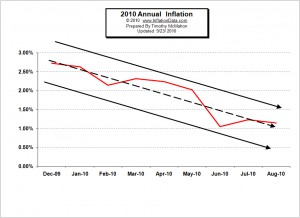Printing Money: The process of "printing" money is always a kind of mystery to most people since only about 10% of the total money supply is actually in physical currency. Technically most of the money isn't printed so the term should be "money creation" or "money supply expansion" but "printing money" is used euphemistically to include all forms of expanding the money supply. The monetary base (or money supply) is typically controlled by adjusting monetary policy. This is usually done by the central bank (in the U.S. this is the Federal Reserve Bank or FED). The FED changes the monetary base through "open market transactions" (i.e., buying and selling of government bonds). The FED also … [Read more...]
Deflation: The Elephant in the Room
We've had almost a Trillion dollars in "stimulus" and/or "Quantitative Easing" or whatever you want to call it and as of the end of August 2010 we still only have 1.15% annual inflation... Down from 1.24% last month. And the trend has been steadily decreasing for all of 2010. Back in 2009 we had a period of deflation bottoming at -2.10% in July of 2009 and the stimulus kicked the inflation rate from its deflationary moorings all the way up to 2.72% in December of 2009. But as we can see from the chart below the effect didn't last long... and the inflation rate has steadily declined for all of 2010 so far. In the light of all that stimulus, the biggest credit bubble in history is … [Read more...]
Goodbye M3 – What is the Government hiding?
by Tim McMahon, Editor I'm surprised we haven't heard much in the news about this but as of March 23rd 2006 the government will no longer be publishing the M3 money supply data. Most people probably say "Who Cares?" Right? But you should care! And here's why: "The Federal Reserve tracks and publishes the money supply measured three different ways-- M1, M2, and M3. These three money supply measures track slightly different views of the money supply. The most restrictive, M1, only measures the most liquid forms of money; it is limited to currency actually in the hands of the public. This includes travelers checks, demand deposits (checking accounts), and other deposits against … [Read more...]


